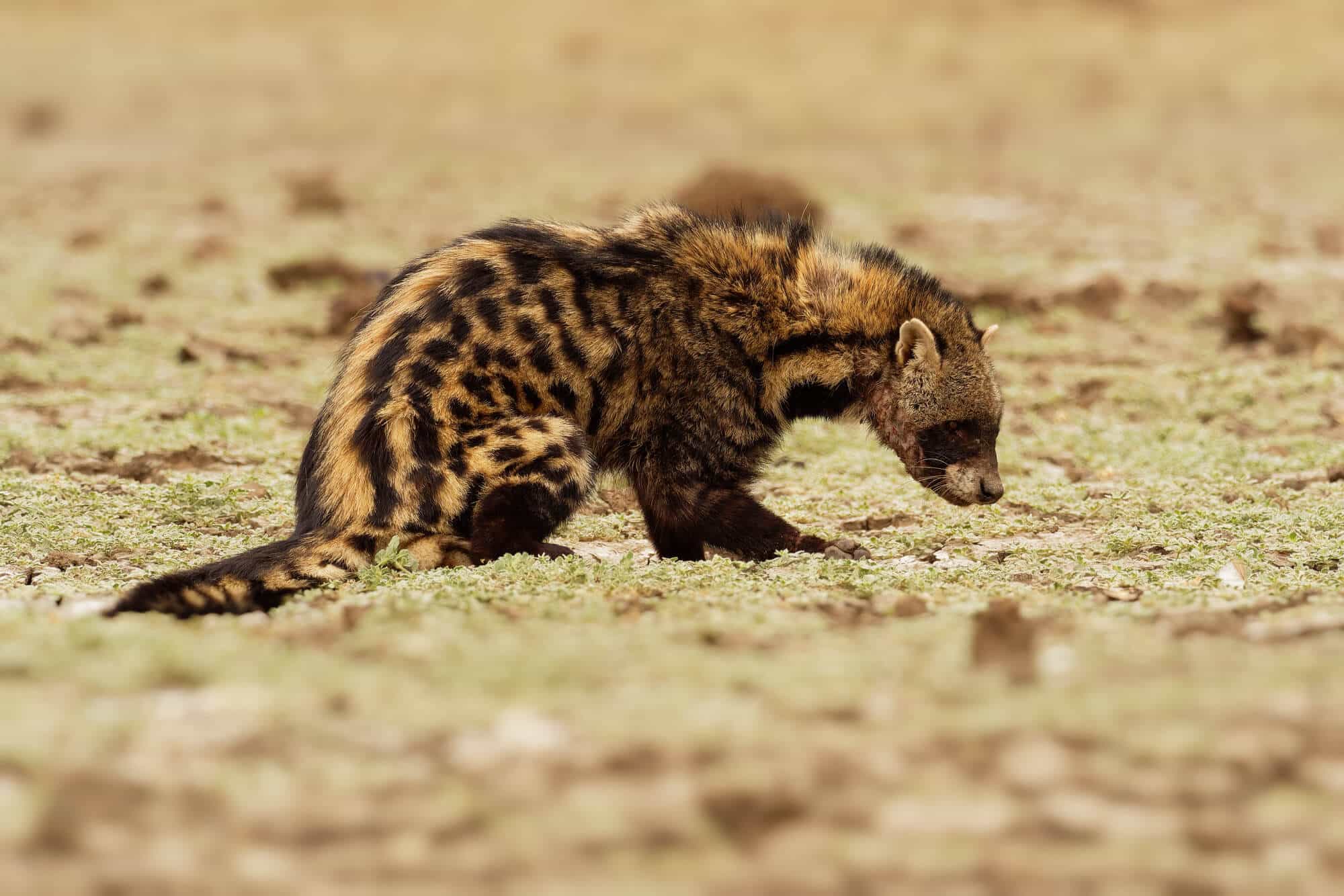The African Zabads are caught in a bar to extract the musk oil that has been used since ancient times to anoint kings. Is it possible to develop a more humane method?

Following the reign of the King of England, I checked and it became clear that in the royal tradition in England mainly, but also in other countries, the new king or queen is anointed with an ointment, one of whose important components is musk. (musk) the same substance distributed by a few mammals to mark a living area and control. The musk used to anoint kings is extracted from an African civet that gave its name to one of the oldest and most expensive perfumes.
The African sheave from which the precious anointing oil is produced is a member of the gahani family (close to mongooses) in which there are different types and it is common in most sub-Saharan regions. There are a small number of mammals that secrete the scented substance and all of them secrete the substance for the purposes of marking and intersexual communication. The scent of the cedar musk lasts a long time and is therefore valued in the perfumery industry.
The scented ointment is produced by "squeezing" glands located in the back of the animal, although sometimes the ointment is collected from scent points that the sardine leaves as a territorial mark. Although both couples (male and female) produce the musk there is a preference for males who produce a larger amount. The output of each individual is between 5 and 15 grams per week.
One of the main countries where the Zabad musk is produced is Ethiopia, which has a long tradition of giving the musk as diplomatic gifts as well as supplying the musk to the perfume industry. The civet musk is produced as a yellow paste with a floral scent. From one kilo of diluted musk paste you can produce about 3000 liters of perfume, and the demand is high mainly from perfume manufacturers.
In Ethiopia, a tradition has developed of keeping the musk in a box in the wardrobe so that the clothes absorb the smell. In the past, Ethiopia supplied about 90% of the world's consumption, but people from groups that work for animal rights are protesting the treatment of the captive Zeds from which the musk is extracted, and to this is added the activity of a black market that also harms animals in the wild.
In addition to the hostile public atmosphere, a combination of devaluation of traditions, development of artificial substitutes by perfume manufacturers and mismanagement caused a decrease in economic viability. As a result, Ethiopia's share in the world market decreased from 90% to 20%.
Added to this is the fact that the population of the cycad in the wild is being harmed even though according to the UN red list it is not an endangered species. The source population for captive breeding is decreasing which of course hurts the Ethiopian traders.
There are several problems caused by the musk industry; The methods of keeping the Zabads in captivity and extracting the musk are secret and infected with systems of superstitions. For example, the breeders believe that if the captive zebras are seen by strangers, they will produce less musk. Capturing and transporting the sardines may harm their well-being and the yield of the musk, as does the keeping in crowded cages and the feeding and hygiene conditions that cause outbreaks of diseases.
Many of the captured individuals die due to inter-individual aggression caused by the changes. As mentioned earlier, there is a fear that the muskrat industry will harm the population in the wild, since most breeders rely on animals captured in the wild instead of trying to breed the muskrats in captivity, a situation that is already causing damage to the breeding areas. There is a reasonable possibility that the collection of the musk from "marking" points in nature will harm communication between the Swedes. Since there is a preference for capturing males, there is a risk of a lack of males to mate with females in the wild.
And again we will mention the tough competition of artificial substitutes for musk. All these factors are a danger for the musk industry which is affected.
In order to succeed and rehabilitate the industry, there is a need for a breeding and production center that will deal with breeding and provide captive-bred breeders with breeding and business management guidelines. The cultivation of zabads for the production of musk in Ethiopia is an ancient branch and as such it is necessary to preserve the tradition and at the same time renew it and adapt it to new times
There is a need to improve the trapping methods to prevent harm to the animals. There is a need to improve the welfare of the animals and the living conditions in captivity to ensure maximum output under adequate welfare and living conditions for the animals, and above all it is necessary to move to breeding in captivity instead of trapping in the bar.
And finally, it is fitting that those who are lucky enough to play and succeed in watching Zabad in Africa should remember that it is possible that his posterior glands produce a perfume that may have been used for the anointing of the kings of Israel and the anointing of Jesus.

2 תגובות
To Mr. "State Comptroller",
Since I wrote the PM based on personal information
that it would be difficult to translate it back and forth,
When claiming mistakes, it is appropriate to provide at least one example,
And in order to be able to relate worthy of identification
And not to hide behind vanity...
Tell the truth: have you used Google Translate? The wording is just bad.